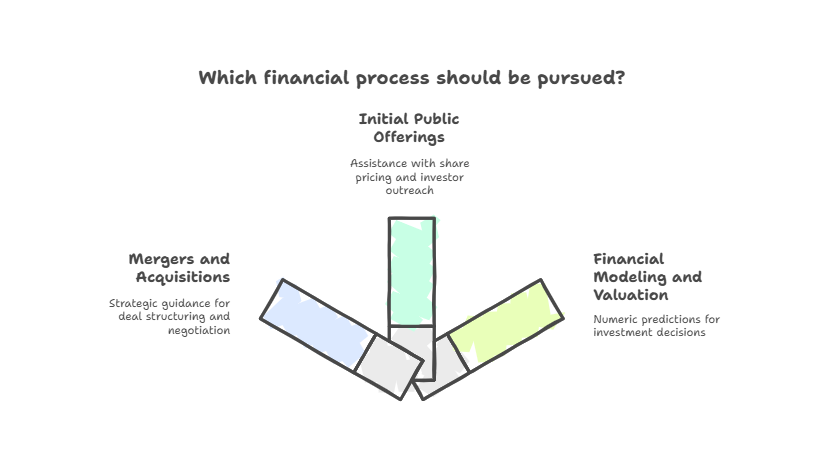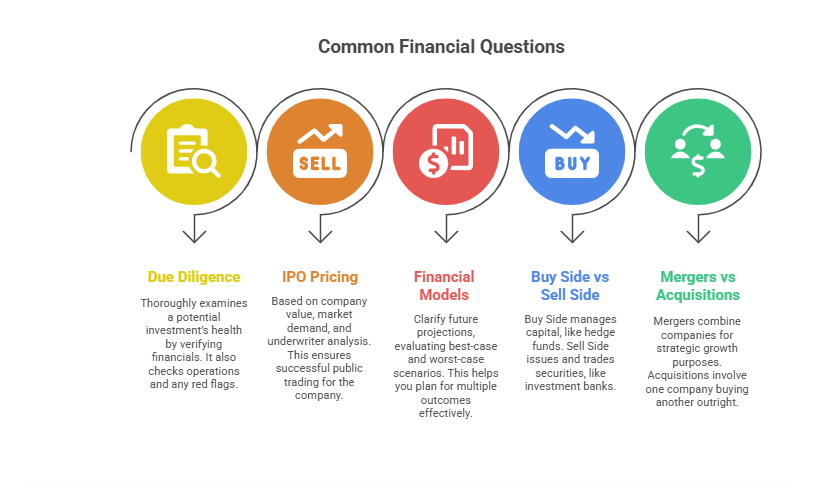
Unlocking Investment Banking Terminology for Smart Investors
Absorb Key Terms
If you’re starting to explore investment banking terminology, it can feel like you’ve wandered into a maze of acronyms and specialized jargon. You might hear phrases like “discounted cash flow” and “leveraged buyout,” and wonder why they matter. The good news is that once you grasp a handful of core terms, you’ll find the world of investment banking less intimidating and far more useful for your long-term wealth strategy.
Investment banking generally refers to financial institutions that help organizations and individuals raise capital, negotiate mergers and acquisitions, and navigate complex transactions. They don’t take deposits like a normal retail bank might. Instead, they rely on developing customized strategies for deals such as IPOs (Initial Public Offerings) and M&A (mergers and acquisitions).
Below is a quick snapshot of key terms you’ll run into:
- Due Diligence: A process of investigating a company’s finances, operations, and risks before a major investment or acquisition (Investopedia).
- Financial Models: Spreadsheets or software-based analyses that predict future performance, cash flow, and valuation (Mergers and Inquisitions).
- Buy Side vs Sell Side: Buy side refers to investors with capital (like hedge funds) who purchase securities, while sell side refers to entities issuing or trading securities (like investment banks) (Corporate Finance Institute).
- IPO (Initial Public Offering): When a private company sells shares to the public for the first time (Investopedia).
Recognize Core Processes

Investment bankers provide strategic guidance during major financial events. If you’re launching a new business or considering a merger, they help you structure deals, find capital, and set valuations. Here’s how some of these processes unfold:
Mergers And Acquisitions (M&A)
In an M&A deal, investment bankers research the market, identify potential partners, and coordinate negotiations. They use valuation models like the discounted cash flow (DCF) to discuss fair prices for both buyers and sellers. On a sell-side engagement, bankers represent the seller, while on a buy-side engagement, they represent a prospective acquirer (CFO University).
Initial Public Offerings (IPO)
When a private company goes public, investment bankers help set the share price, prepare the S-1 registration statement for the Securities and Exchange Commission (SEC), and manage outreach through a “road show” to potential investors (Wall Street Prep). For many high-net-worth investors, an IPO can be a pivotal moment if you hold private shares prior to the listing.
Financial Modeling And Valuation
Whether you want to forecast returns on a prospective acquisition or figure out how a new venture might boost your portfolio, financial modeling is the numeric backbone of these predictions. Models like the NAV (Net Asset Value) for energy firms or the Dividend Discount Model (DDM) for banks and insurance companies are prime examples (Mergers and Inquisitions). These calculations can guide your decisions about when to buy, sell, or hold.
Apply These Concepts

Understanding these terms and processes empowers you to make stronger investment choices. If you’re wondering how to put this into practice, here are a few suggestions:
- Map out goals first. If your objective is asset growth, focus on how valuation metrics and returns fit your timeline.
- Discuss these terms with your wealth advisor, personalizing them to your existing holdings.
- When reviewing an M&A opportunity, remember that thorough due diligence includes both financial and cultural factors.
You can also explore how these terms relate to your personal investing approach. For instance, you might check out investment education for more context on how professional investors strategize. If you plan to dive into business expansion soon, consider learning about how to invest in privately held companies as well.
Address Common Questions

In one breath, you might find yourself asking: what is due diligence, how does an IPO get priced, why do financial models matter, what are the differences between buy-side and sell-side, and how do mergers actually happen?
Below are short answers that help put you at ease:
- Due Diligence focuses on thoroughly examining a potential investment’s health by verifying financials, operations, and any red flags.
- An IPO is priced based on company value, market demand, and underwriter analysis to ensure successful public trading.
- Financial Models clarify future projections, evaluating best-case and worst-case scenarios so you can plan for multiple outcomes.
- Buy Side involves managing large sums of capital (e.g., hedge funds), whereas Sell Side typically issues and trades securities (e.g., investment banks).
- Mergers are about combining companies for strategic growth, while acquisitions involve one company buying another outright.
Take Your Next Steps

Stepping into the realm of investment banking terminology might initially feel a little daunting, but you’re not on your own. By gaining clarity on core processes, you’re better prepared to discuss your strategy with wealth advisors, gauge IPO opportunities, or even shape an M&A deal.
If you’d like to keep strengthening your knowledge, consider speaking with a professional about how to form an investment fund. You could also explore specialized avenues if you’re seeking investors for business or looking into an individual investment account.
Overall, it’s all about preparation. The more comfortable you are with these terms, the more confident you’ll feel in making bigger, bolder financial decisions—especially those that safeguard your wealth for generations to come. Remember, understanding the language of investment banking is just another way to ensure your portfolio reflects your goals, priorities, and vision for the future.
Showcase your recognition by adding our award badge to your website! Simply copy the code below and embed it on your site to highlight your achievement.

Recent Posts
Investment Firms in Los Angeles to Consider
Los Angeles is home to a diverse and dynamic financial...
Investment Firms in New York to Consider
Choosing the right investment firm is crucial for achieving your...





